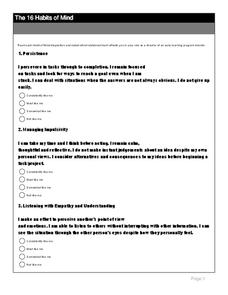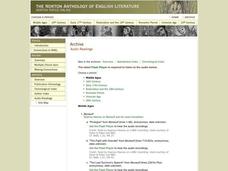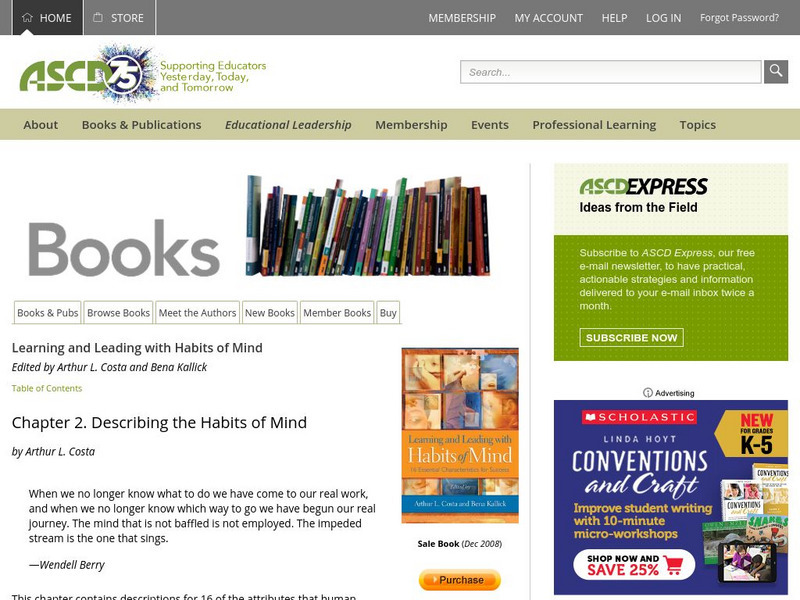Curated OER
The 16 Habits of Mind
Study the 16 Habits of Mind with a professional resource. Based on Describing 16 Habits of Mind by Arthur L. Costa and Bena Kallick, the resource details 16 ways learners perceive problems around them and produce ways to deal with those...
Curated OER
Project-Based Learning & Leading Through the 16 Habits of Mind
Blending Costa & Kallick's 16 Habits of Mind, personality type, and project-based learning in your classroom.
Center School
The 16 Habits of Mind
Which of Costa's 16 Habit of Mind best describes you? Take a short assessment to see which quality is most consistently like you, or which quality is not like you at all.
Community High School of Vermont
Habits of Mind
Here is a comprehensive unit on the 16 Habits of Mind that includes a wide variety of activities, worksheets, differentiation strategies, and instructor notes. The unit consists of 18 lessons and offers an organized progression of...
Teachers Development Group
Habits of Mind Interaction Posters
From generalizing and justifying to megacognition reflection and perseverance, keep the 16 Habits of Mind as part of an ongoing and developing conversation in your class by displaying these posters around your room throughout the school...
Norfork School District
Habits of Mind
Why do artists create? To solve a problem, of course. Young artists work individually and then in groups to create observational, imaginative, and narrative drawings in response to an assignment that requires them to employ all 16 Habits...
Community High School of Vermont
Habits of the Mind
An informative one-page resource details the 16 Habits of Mind. Habits encourage positive problem-solving, self-awareness, creativity, and dedication—lifelong skills that can be used in both academic and social settings.
Australian National Schools Network
Habits of Mind Posters
If you are implementing the 16 Habits of Mind into your class and curriculum, check out this set of posters that you can display in your room. Each poster highlights one Habit of Mind and includes a brief description of its objective.
Health Smart Virginia
What's Up with Mindfulness
Mindfulness is all about paying attention to the present. Introduce freshmen to a stress-reducing tool that helps them pay close attention to what is happening, choose their behavior, and respond. Learners use a timeline to track their...
Education Development Center
Algebraic Habits of Mind
Math really is just one big puzzle waiting to be solved. Show learners that math can be intriguing and provide them with visually engaging problems and puzzles. The focus is on solving simple equations and looking at expressions.
Delaware Health and Social Services
Set Your Mind, Set Your Goals
Becoming a woman can be overwhelming for girls. An educational resource assists female learners in setting goals for their reproductive choices, physical health, and emotional and mental well-being.
Transforming Education
Self-Efficacy Toolkit
A PowerPoint presentation prepares instructors for teaching learners about self-efficacy, a key competency of social-emotional learning. The 29-page presentation is designed to give administrators and teachers a deeper understanding of...
Curated OER
Alex, Mel, and Chelsea Play a Game
This short probability question may look simple at first, but it is actually quite complex! Learners must understand independent events in context and must take into account several different scenarios. Use as an individual assignment...
Illustrative Mathematics
Alike or Different Game
How are a circle and triangle alike? How are they different? These are the types of questions children will answer while playing this fun geometry game. Including a variety of conventional and unconventional shapes, this activity allows...
Illustrative Mathematics
Quinoa Pasta 1
Here is a great opportunity to introduce your mathematicians to a food they may never have heard of, quinoa. It may help to show a short video on quinoa, or make some quinoa for the class to try. Once they get over how to say quinoa,...
Curated OER
The Dinosaur Diner
Students explore the food chain. In this dinoaur lesson, students identify charactersitics of an omnivore, carnivore, and herbivore. Students sort dinosaur picture/word cards into groups by their eating characteristics. Students also...
Indiana University
World Literature: "One Evening in the Rainy Season" Shi Zhecun
Did you know that modern Chinese literature “grew from the psychoanalytical theory of Sigmund Freud”? Designed for a world literature class, seniors are introduced to “One Evening in the Rainy Season,” Shi Zhecun’s stream of...
Curated OER
Key Ingredients: America by Food
Students participate in a series of activities to explore the types of food Americans eat, how food choices differ in various parts of the country, and how the availability of various foods has changed over time.
Curated OER
Key Ingredients: America By Food
In this set of five lessons, students analyze the important of food traditions, identity, and history. Students analyze how food traditions contribute to family identity, investigate family food traditions through interviews, and compare...
Curated OER
Million Dollar Machine
Students explore their self-awareness. They discuss the words unique, extraordinary and irreplaceable and their strengths and weaknesses. They write five things their bodies or Million Dollar Machines can do and investigate their blood...
Edutopia
Edutopia: Blog: Habits of Mind: Terrell Heick: 16 Habits of Mind
Learn about the concept called Habits of Mind and explore 16 key habits for academic success.
Association for Supervision and Curriculum Development (ASCD)
Ascd: Learning and Leading With Habits of Mind
Learn about the 16 traits that people display when handling life with intelligence, referred to as Habits of Mind.























